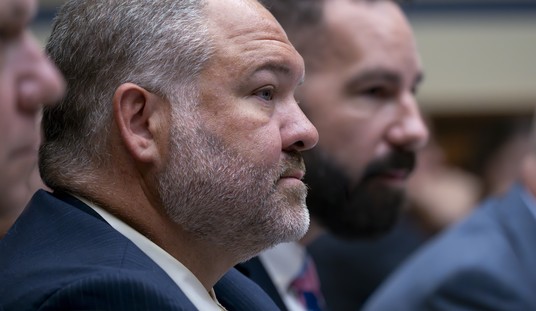“The temptation is to laugh at Bruce Springsteen and his admirers,” Ryan Cole writes in the Weekly Standard, in “Born to Rant:”
Springsteen embraced the imagery, iconography, and gestures of the genre. He threw on a leather jacket, sculpted his sideburns, and posed broodingly in Corvettes and Cadillacs. Then he name-checked John Steinbeck and Flannery O’Connor, sang of American decay and inequality, and rebuffed Ronald Reagan, whose reelection campaign had the nerve to assume that “Born in the USA”—a gloomy song about a homeless Vietnam veteran dolled up with a misleadingly anthemic chorus and sold with imagery of Springsteen draped in Old Glory—was actually a statement of patriotism. Which is not to say that Sprinssteen isn’t a patriot. It’s just that he articulates progressivism’s brand of national pride: America is noble in theory, nightmarish in reality; cool around the edges, but rotten to the core.
James Wolcott, writing in Vanity Fair, once quipped that it was almost as if Springsteen was “built to rock-critic specifications.” Others, such as Fred Goodman in Mansion on the Hill: Dylan, Young, Geffen, and Springsteen and the Head-on Collision of Rock and Commerce (1997), have suggested that his career since partnering with Landau has been one long and meticulously plotted public relations exercise to present the Boss as a rock ’n’ roll holy man.
If that’s the case, it has worked: Springsteen has sold and continues to sell millions of albums, and his shtick is catnip to baby boomers. In fact, a standard component of Springsteen hagiography is the breathless recollection of that moment, long ago, when the author, young and searching for truth, first stumbled across the Boss’s magic. For David Brooks, it was February 1975, when he caught a live performance on WMMR in Philadelphia. For David Remnick, it was November 1976, from his perch on the balcony of New York City’s late Palladium. It was heady stuff, no doubt—and it forged four decades of adoration, which often gives the impression that some writers view Bruce Springsteen the same way young boys do, say, Superman.
And yet, despite the comparisons to Elvis Presley, as well as to Chuck Berry, both of whom created music that was an amalgamation of prior American styles, Springsteen’s work is strikingly inorganic. With its fist-pumping chord changes, cluttered arrangements full of guitars, runaway xylophones, and honking saxophones, layered behind his maudlin, over-emoting voice, with its affected “heartland” accent, Springsteen’s music is meticulously processed and choreographed, akin to ersatz rock show tunes conceived by a committee of rock critics and Broadway producers.
Coming of age in the pre-Beatles era in which critics began to treat rock music as Serious High Art, Presley and Chuck Berry viewed themselves as performers. A very different role than the strange working class yet cult-like figure that Bruce proffers, more so to adoring critics, than his fans, the majority of whom simply want to boogie and luxuriate in the hits and those golden memories of seedy small town New Jersey, circa 1975. And as Cole writes, Springsteen offers up endless portraits of working class losers, but little opportunity for transcendence, despite Springsteen’s own staggering achievements:
Springsteen’s songs, in fact, often overlook how dynamic this land truly is: In his telling, untouchable corporations, cruel lawmen, and lawless leaders inevitably block the working folks’ access to the American Dream. You need not turn a blind eye to America’s deficiencies to see how incomplete this picture is, as summed up by “The River,” the title track from Springsteen’s 1980 album. Its young protagonist takes his love down to the aforementioned river and impregnates her. Then comes the shotgun wedding and the union card (I got a job working construction for the Johnstown Company / But lately there ain’t been much work on the account of the economy). As Springsteen sings, Man, that was all she wrote. But isn’t the Boss’s success and fortune—he is, after all, the son of a working-class father, as his admirers never tire of pointing out—evidence against the inevitability of his own narrative?
But if Springsteen’s characters pulled themselves up by their bootstraps and made something of their lives, they’d be (a) off the dole, (b) America wouldn’t be the 3000 mile-wide hellhole that Springsteen (and Landau’s) ideology demands that it to be and (c) they’d be less likely to vote for whichever Democrat political candidate Springsteen and Landau are plumping for that year. So instead, Bruce is born to run — on a golden treadmill to nowhere. Too bad; those albums from The Wild, The Innocent through Burn in the USA before Springsteen became as, Paul Shaffer’s Don Kirshner would say, “a viable commercial product,” were pretty awesome.
Related: “Despite highest poverty numbers in 50 years, Obama okays illegals to compete for jobs in US.” Sounds like the underpinnings of a great Springsteen song on the plight of the American working man, if only the Boss weren’t completely in the tank for Barry and whatever his political whims are this week.










Join the conversation as a VIP Member